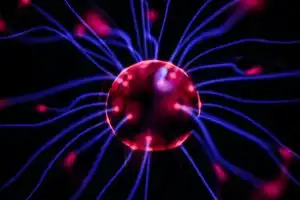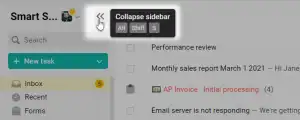Multitasking has been a hot topic lately, and most of us know we’re not really supposed to do it. But why? Turns out, trying to work on multiple tasks at once is almost always a surefire way to lower your productivity. In this blog post, I’m exploring how this works, and why we all try to multitask anyway. Plus, I’ll point out how Pyrus can help streamline your work and keep your productivity sky high.
Multitasking at Work
This Forbes article is a great place to start if you want to understand why we even multitask in the first place. Turns out, being able to attend to multiple tasks simultaneously is a survival mechanism. Our brains have to be able to get distracted in order to notice threats. However, in the modern workplace, we’re not usually being threatened by the things that distract us. Instead, we’re taking on more than one task at once because it makes us feel more productive. That’s where we have to catch ourselves. Being busy does not mean being more productive.
Instead, multitasking actually hampers our ability to get almost any task done well. This comprehensive study found that those who multitask more frequently turn out to be worse at it. As that Forbes article points out, multitasking disorganizes your workday. Responding to requests and notifications throughout the day is less efficient than blocking out time for one task at a time. (I actually wrote about how email inboxes feed into this problem in this earlier post.) So basically, we multitask because it feels productive, but it actually makes us less so.
Of course, there are some times when multitasking can work just fine. This video from Fast Company gives some examples, like listening to an audiobook while folding laundry. The trouble is that the kind of simplistic tasks we can do simultaneously aren’t usually work tasks. The exception is creative brainstorming. As I observed in this earlier post, taking breaks helps creative thinking flourish. So perhaps getting in some exercise while brainstorming is one way multitasking can work for you.
The Brains Behind It All

You may be wondering about the brain science that can explain these effects. This video from CNN explains the basics. Essentially, when your brain multitasks, it’s actually switching rapidly between different tasks. To do that, it not only takes time but also cognitive resources. Thus, multitasking strains your brain and reduces your ability to work productively. In other words, your brain could do both tasks better if you just did them one at a time.
I found this study on distracted driving to be quite interesting as well. Using fMRI, a brain imaging technique, researchers discovered that multitasking decreases attention abilities. In this study, they focused on participants driving while listening to audio. In the brain region responsible for spatial awareness, distracted drivers had 37% less activation than focused drivers. That should tell you how much you can affect the quality of your work by multitasking.
The Effects of Multitasking
Brain science aside, multitasking lowers productivity in a bunch of observable ways. This Forbes article shares a few. For instance, when your attention is split, you’re more likely to miss important details. That can lead you to misunderstand important information or instructions. It can also cause you to make costly mistakes in work you produce. On top of that, multitasking can actually increase stress, a problem I wrote about in this earlier blog post.
The research shows that you’ll also struggle with some other critical skills. This summary of research from the American Psychological Association covers several. For example, every time you switch between tasks, your brain has to struggle to remember where you left off the last time you paid attention to this. In addition, you use bandwidth constantly to monitor when you should switch again. This study also demonstrated that those who multitask more often are more susceptible to distractions. In other words, when you’re trying to pay attention to multiple tasks at once, you can’t pay attention to any of them well.
How to Regain Focus
By this point, you’re realizing that we multitask all the time, but it’s hurting our work, and the science proves this. What can we do? Fortunately, there are plenty of strategies to save your productivity. You can start with the ideas I wrote about earlier in my blog about time management. There are also some ideas in this video from Fast Company. They suggest starting your workday with some stream of consciousness writing, for instance. That can help you get distractions out of the way and focus later.
Another idea the video brings up is paying attention to emotional triggers that might encourage multitasking. Some people may try to tackle multiple tasks at once when they feel overwhelmed and anxious. If your anxiety is tied to impostor phenomenon, try learning more about it and increasing your confidence at work. If you can lower your self doubt, you might feel more prepared to invest in each task fully.
Finally, this Forbes article lists some tricks to better manage your tasks. A lot of them overlap with the ideas I shared in this post about rewiring our habits. Try decreasing the friction that prevents you from focusing. That might mean closing other tabs on your laptop or setting your phone to Do Not Disturb. Then, start small: focus on small tasks one by one. You can also try to schedule your day in advance. That way, you should know which task to attend to at any given moment. Remember to schedule in breaks! Sometimes, multitasking is your brain’s way of trying to get away from work. If you struggle to take good breaks, try the strategies I identified in this post.
Tackling Tasks Productively With Pyrus
It may seem like focusing well and avoiding multitasking is really hard in the world of remote work. When we’re working on devices with multiple tabs and constant notifications, how do we focus? Fortunately, Pyrus is a task management tool that can help.

Pyrus streamlines communication to link all discussions with discrete tasks. This is already a good way to minimize distractions and notifications at work. However, Pyrus has gone further. As this article with recent updates explains, Pyrus software now lets users hide the right and left side panels when working on a task. As a result, you can set yourself up for success against the threat of multitasking. With Pyrus, you can focus and move your work forward.